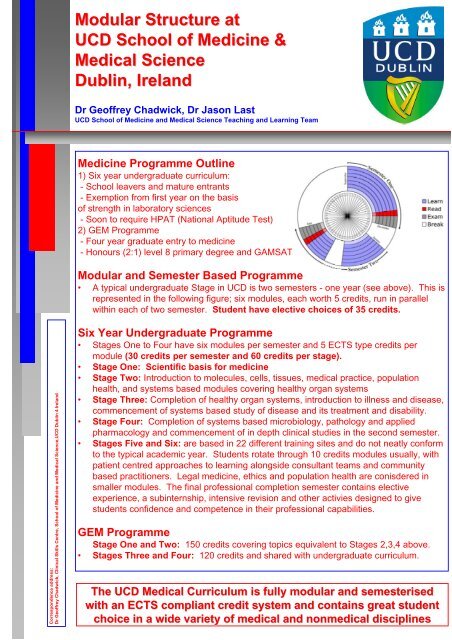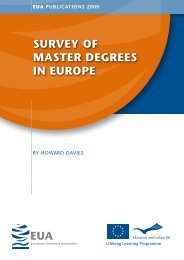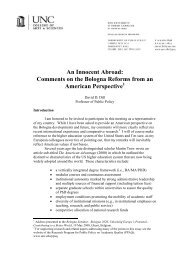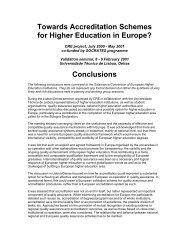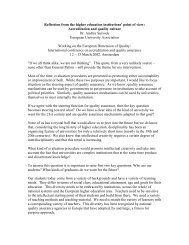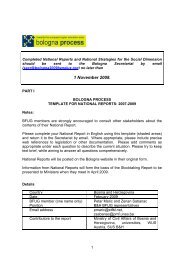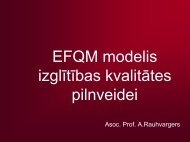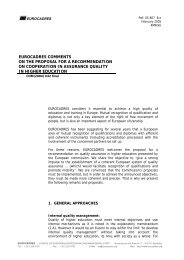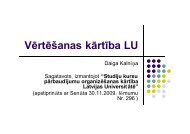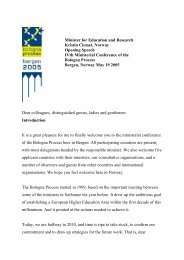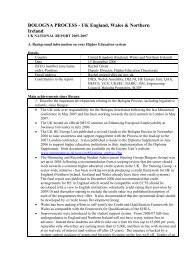BOLOGNA AND MEDICAL DEGREES – THE IMPORTANCE OF ...
BOLOGNA AND MEDICAL DEGREES – THE IMPORTANCE OF ...
BOLOGNA AND MEDICAL DEGREES – THE IMPORTANCE OF ...
You also want an ePaper? Increase the reach of your titles
YUMPU automatically turns print PDFs into web optimized ePapers that Google loves.
Correspondence address:<br />
Dr Geoffrey Chadwick, Clinical Skills Centre, School of Medicine and Medical Science,UCD Dubiin 4 Ireland<br />
Modular Structure at<br />
UCD School of Medicine &<br />
Medical Science<br />
Dublin, Ireland<br />
Dr Geoffrey Chadwick, Dr Jason Last<br />
UCD School of Medicine and Medical Science Teaching and Learning Team<br />
Medicine Programme Outline<br />
1) Six year undergraduate curriculum:<br />
- School leavers and mature entrants<br />
- Exemption from first year on the basis<br />
of strength in laboratory sciences<br />
- Soon to require HPAT (National Aptitude Test)<br />
2) GEM Programme<br />
- Four year graduate entry to medicine<br />
- Honours (2:1) level 8 primary degree and GAMSAT<br />
Modular and Semester Based Programme<br />
• A typical undergraduate Stage in UCD is two semesters - one year (see above). This is<br />
represented in the following figure; six modules, each worth 5 credits, run in parallel<br />
within each of two semester. Student have elective choices of 35 credits.<br />
Six Year Undergraduate Programme<br />
• Stages One to Four have six modules per semester and 5 ECTS type credits per<br />
module (30 credits per semester and 60 credits per stage).<br />
• Stage One: Scientific basis for medicine<br />
• Stage Two: Introduction to molecules, cells, tissues, medical practice, population<br />
health, and systems based modules covering healthy organ systems<br />
• Stage Three: Completion of healthy organ systems, introduction to illness and disease,<br />
commencement of systems based study of disease and its treatment and disability.<br />
• Stage Four: Completion of systems based microbiology, pathology and applied<br />
pharmacology and commencement of in depth clinical studies in the second semester.<br />
• Stages Five and Six: are based in 22 different training sites and do not neatly conform<br />
to the typical academic year. Students rotate through 10 credits modules usually, with<br />
patient centred approaches to learning alongside consultant teams and community<br />
based practitioners. Legal medicine, ethics and population health are conisdered in<br />
smaller modules. The final professional completion semester contains elective<br />
experience, a subinternship, intensive revision and other activies designed to give<br />
students confidence and competence in their professional capabilities.<br />
GEM Programme<br />
Stage One and Two: 150 credits covering topics equivalent to Stages 2,3,4 above.<br />
• Stages Three and Four: 120 credits and shared with undergraduate curriculum.<br />
The UCD Medical Curriculum is fully modular and semesterised<br />
with an ECTS compliant credit system and contains great student<br />
choice in a wide variety of medical and nonmedical disciplines


